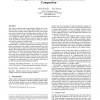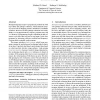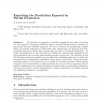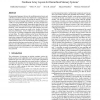874 search results - page 56 / 175 » Predicting the Running Times of Parallel Programs by Simulat... |
ICCD
2008
IEEE
15 years 10 months ago
2008
IEEE
— Increasing sizes of benchmarks make detailed simulation an extremely time consuming process. Statistical techniques such as the SimPoint methodology have been proposed in order...
114
click to vote
PLDI
2006
ACM
15 years 7 months ago
2006
ACM
The widely used Mark-and-Sweep garbage collector has a drawback in that it does not move objects during collection. As a result, large long-running realistic applications, such as...
194
click to vote
ASPLOS
2009
ACM
16 years 2 months ago
2009
ACM
Managed languages improve programmer productivity with type safety and garbage collection, which eliminate memory errors such as dangling pointers, double frees, and buffer overfl...
124
click to vote
IFIPPACT
1994
15 years 2 months ago
1994
: We describe an approach to parallel compilation that seeks to harness the vast amount of ne-grain parallelism that is exposed through partial evaluation of numerically-intensive ...
109
click to vote
ICS
1999
Tsinghua U.
15 years 5 months ago
1999
Tsinghua U.
Programming languages that provide multidimensional arrays and a flat linear model of memory must implement a mapping between these two domains to order array elements in memory....




